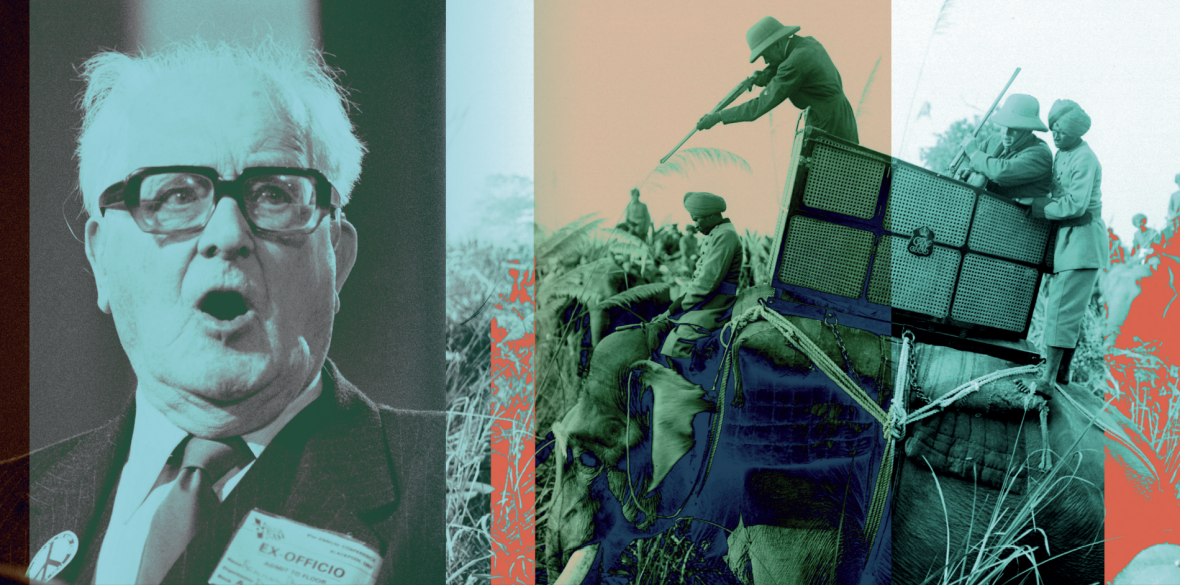This is the last article you can read this month
You can read more article this month
You can read more articles this month
Sorry your limit is up for this month
Reset on:
Please help support the Morning Star by subscribing here
THIS evening former leader of the Labour Party and our co-president Jeremy Corbyn, will deliver the inaugural annual Liberation Fenner Brockway lecture.
The lecture, like so many other things, delayed from last year because the Covid-19 pandemic, gives Liberation an opportunity to celebrate perhaps our most significant founder, but also to argue for a British foreign policy that puts people first rather than the interests of capitalism.
There is no more appropriate person to deliver the lecture about one of the key driving forces behind the setting up of the then Movement for Colonial Freedom than Jeremy Corbyn. Both shared a fierce commitment to socialism as a solution capitalism and imperialism.
Archibald Fenner Brockway was a child of the British colonialist project, having been born in Calcutta, India, in 1888, to missionary parents.
After moving to Britain aged four, Fenner, as he was more widely known, joined the Independent Labour Party in 1907 having left school at the age of 16 to begin work as a journalist.
In his first year, while working at the Daily News, he interviewed the legendary socialist politician Keir Hardie, who remained a major influence on him for the rest of his life.
Fenner was a committed pacifist during the imperialist so-called Great War of 1914-18. His uncompromising opposition to British involvement in the war saw him imprisoned several times for his beliefs.
Fenner was a committed anti-imperialist. In 1919 he became editor of the publication India and was the last joint secretary of the British Committee of the Indian National Congress, sharing the post with Syed Hussein. In 1928 he became the first chairman of the League Against Imperialism.
He continued his anti-imperialist activities and joined the India League in 1929, the same year he was elected as MP for Leyton East in London, and served on the executive committee in the early 1930s.
In 1930 Fenner was suspended from Parliament for protesting against the imprisonment of Gandhi and Nehru and thousands of other members of India’s Congress Party.
He also wore a Gandhi cap in the House of Commons when protesting against the arrest of congressmen for wearing it.
Fenner was part of a wide-ranging network of anti-colonial activists and organisations in London and served as chairman of the No More War Movement.
During the 1930s, Fenner moved away from pacifism, supporting the International Brigades in their fight against Franco in the Spanish civil war as well as Britain’s involvement in the second world war.
In 1954 Fenner, was one of the founder members of the Movement for Colonial Freedom. Supporters of this new group enjoyed the support of around 70 MPs including the likes of Tony Benn, Barbara Castle and future prime minister Harold Wilson. Fenner became the chair with Tony Benn the treasurer.
The prime motivation behind the formation of the new organisation was the rebellion in Kenya commonly known as the Mau Mau uprising in 1952.
The Mau Mau rebellion was brutally suppressed by the British colonial forces with an estimated 11,000 deaths among the local population. The British are said to have executed 1,090 Africans by hanging.
Fenner continued to play an active role in the Movement for Colonial Freedom even after being made a Labour peer in 1964 and beyond 1970 when the organisation changed its name to Liberation.
In 1980 Fenner was asked what had made him a socialist. In his reply he referred to an eye-opening tour of Britain’s deprived communities that he made in 1932.
He said he witnessed poverty and a depth of malnutrition across the whole nation stretching from the mining towns of Wales to the shipbuilding communities of north-east England, the industrial settlements of the Black Country and the rural villages of Norfolk.
“I came, as a young journalist, to London, and lived in a settlement in Islington. It was the appalling poverty of the people,” recalled Brockway of his socialist awakening in the early 1900s.
“Most of the workers, casual workers, were out of work for half the week. No unemployment benefits. Only the workhouse. There was literal starvation in their families. Children used to be coming to school hungry, every day.
“There has been a social revolution, not a socialist revolution, since those days … In the 1930s I did a survey of this country. I could only call my report, Hungry England. There was literally hunger.”
It seems we have returned to the days observed by Fenner. Reports of malnutrition, scurvy and rickets have returned to haunt us today. There are more foodbanks than certain fast-food companies.
The experience of some young children is that you get your food from a foodbank and not a supermarket.
One of the lessons for me from the life of Fenner — who died just shy of his hundredth birthday on April 28 1988 — is that the fight against capitalism in Britain is indivisible from the battle against its highest stage, imperialism.
Our anti-imperialist activism can’t be based on some sort of condescending and patronising view of the world where the great white saviour comes to the rescue of us poor people of African descent. We have our own agency — but we do need solidarity.
Fenner inspires me because he never presumed he could talk on our behalf without listening to us. Like Jeremy Corbyn does today, he listened fiercely and spoke earnestly and with passion and acted on it. It was never posturing or just more meaningless talk, as with so many of the plastic politicians in Parliament today.
This evening we celebrate the contribution made by this great man to the worldwide movement against colonialism. Join Liberation to help continue this work.
Roger McKenzie is a journalist and general secretary of Liberation (liberationorg.co.uk).










